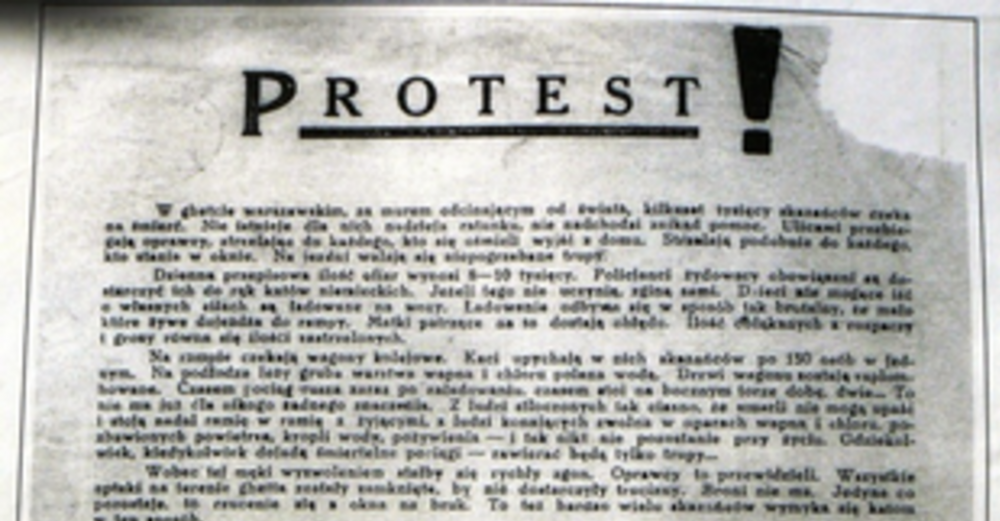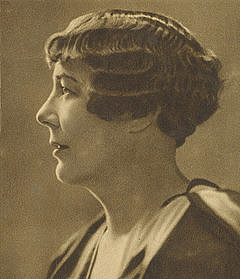- News
- Events
- Oneg Shabbat
- Collections
- Research
- Exhibitions
- Education
- Publishing Department
- Genealogy
- About the Institute
- Bookstore


The world looks at this crime, more horrible than anything the history has ever seen, and is silent. The slaughter of millions of people continues in ominous silence — wrote Zofia Kossak-Szczucka while every day to the extermination camp in Treblinka thousands of Warsaw Jews were being taken. — The executioners are silent, they do not boast about what they are doing. England is silent, so is America, even the influential international Jewry, so sensitive in its reaction to any transgression against its people, is silent. Poland is silent... Dying Jews are surrounded only by a host of Pilates washing their hands in innocence.
“Protest” by Kossak-Szczucka was placed on the streets of Warsaw on 11th August, 1942. The anniversary of this event is on the 11th August which is already the upcoming Sunday.
Endowed with great authority, the writer, in connection with her pre-war works was recognized by the occupation authorities as a person oriented anti-German. She had to go into hiding. However, she participated actively in the underground, editing an underground newspaper. She also led the Catholic Polish Renaissance Front (FOP). In 1943 she was arrested for her actions and put in the concentration camp in Oświęcim, and then transferred to Pawiak, where, thanks to the underground, it was possible to get her out the following year.
Kossak-Szczucka did not fight to improve the situation of the murdered Jews merely through words. She herself and people around her, mainly associated with the FOP, collected money necessary to get documents for the hiding Jews. They helped them with finding

employment and placed Jewish children in orphanages run by nuns. — It was a bunch of women — recalled her then-colleague, Wladyslaw Bartoszewski — who wanted to work on the basis of the old philanthropy, the nineteenth-century, the one from Orzeszkowa’s books. But it was a bunch of truly noble and honest women, for whom the possible consequences did not matter.
Help organized by Kossak-Szczucka initially covered about 180 people. The writer quickly realized that it was not even a drop in the bucket of needs. Along with her like-minded social activists, she exerted continuous pressure on the Government Delegation for Poland so that they gave more institutional character to the various attempts to help the Jews and supported them financially. Their actions paid effect in September 1942 when the Konrad Żegota Provisional Committee to Aid Jews was appointed under the leadership of Kossak-Szczucka and Wanda Krahelska-Filipowicz. In December, the Committee was transformed into the Council to Aid Jews, „Żegota”, which operated under the auspices of the government and was able to help, however to varying degrees, tens of thousands of Jews.
The involvement of Zofia Kossak-Szczucka in helping the Jews is admirable. Therefore, even more surprising seem philosophical statements made by her at the same time: “We, Catholics-Poles, speak up. Our feelings toward Jews have not changed,” she wrote in “Protest”. „We do not stop thinking of them as political, economic and ideological enemies of Poland. [...] The awareness of these feelings, however, does not free us from the obligation to condemn the crimes. We do not want to be Pilates.”
Researchers still argue about what gave Kossak-Szczucka stronger motivation: faith (after all, a Christian should love even the enemy, for which the Jews were regarded as by her), or care about the moral condition of the Polish nation, exposed to degradation by the complicity in the crimes carried out by the Germans on their Jewish neighbors. There is no doubt that Kossak-Szczucka belonged to those, whose voice in defense of the Jews brutally murdered was one of the few audible in occupied Poland. For the aid brought during the war to the Jews, she was awarded the medal „Righteous Among the Nations.”